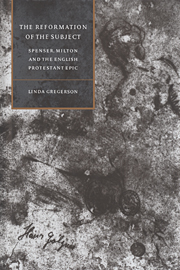Book contents
- Frontmatter
- Contents
- Acknowledgments
- Introduction
- 1 Emerging likeness: Spenser's mirror sequence of love
- 2 The closed image
- 3 Narcissus interrupted: specularity and the subject of the Tudor state
- 4 The mirror of romance
- 5 Fault lines: Milton's mirror of desire
- 6 Words made visible: the embodied rhetoric of Satan, Sin, and Death
- 7 Divine similitude: language in exile
- List of works cited
- Index
1 - Emerging likeness: Spenser's mirror sequence of love
Published online by Cambridge University Press: 08 October 2009
- Frontmatter
- Contents
- Acknowledgments
- Introduction
- 1 Emerging likeness: Spenser's mirror sequence of love
- 2 The closed image
- 3 Narcissus interrupted: specularity and the subject of the Tudor state
- 4 The mirror of romance
- 5 Fault lines: Milton's mirror of desire
- 6 Words made visible: the embodied rhetoric of Satan, Sin, and Death
- 7 Divine similitude: language in exile
- List of works cited
- Index
Summary
The knight in the glass
The narrative sequence of Spenser's Faerie Queene is such that we know his Knight of Chastity by her prowess and her cause before we know her by her motives, or her causes. In the ceremonial beginning of The Faerie Queene Book III, Britomart wins her narrative place from each of her heroic predecessors in turn: from Guyon, whom she defeats in a test of knightly skill, and from Redcrosse, the narrative forebear of them both, who now requires her martial rescue. By means of an orderly succession, therefore, the mantle of presiding exemplum passes from Holiness to Temperance to Chastity, whose virtue, and whose adventures, will govern the third book of Spenser's poem. In what follows, I shall chiefly emphasize those ways in which Chastity's tale departs from the narrative and representational formulas that, with relative stability, govern Books I and II, but these departures are of consequence precisely because they inflect and explicate foundational parallels. In Britomart's addendum to the genre of chivalric romance, the reciprocal unfolding of errancy and linear purpose is further complicated by the differential interplay between ostensible and occluded intentions, initiating and interpolated quests; the inevitable contingencies of martial and moral example are aggravated by the problematics of surrogacy and erotic “invention.”
In the foregoing Introduction, I identified three “inoculatory” strategies designed to reform the idolatrous potential of epic poetry and its readership, while preserving the considerable momentum that begins as idolatrous longing.
- Type
- Chapter
- Information
- The Reformation of the SubjectSpenser, Milton, and the English Protestant Epic, pp. 9 - 47Publisher: Cambridge University PressPrint publication year: 1995



